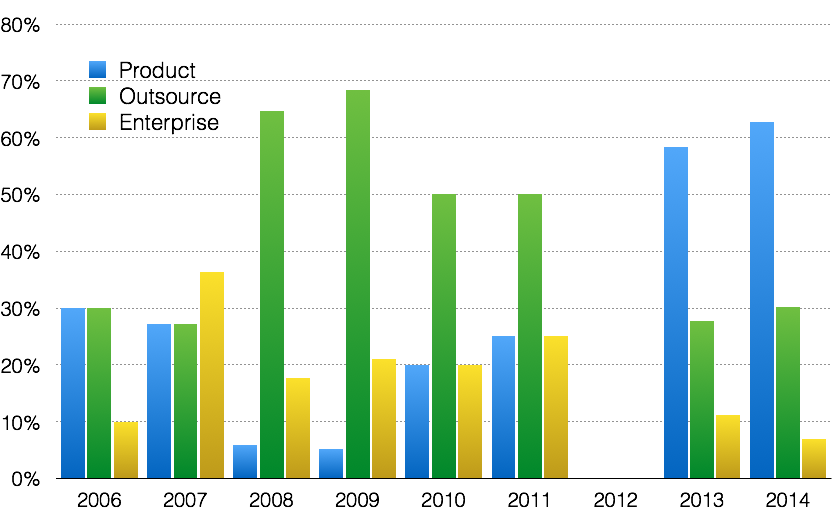Adoption of Ruby by Japanese Businesses

Paul McMahon
The first Ruby related event I attended in Japan was Ruby Kaigi 2007. At the conference, from talking to other developers, I was surprised to learn that despite them being passionate about Ruby, they weren’t using Ruby at their day job. Since then, things have changed, and today most Ruby developers I talk to at events are using Ruby professionally as well.
When I was looking over this year’s Ruby Kaigi sponsor list, I noticed the sponsors were quite different from that of my first Ruby Kaigi. Seeing this, I realized the sponsors were a good proxy for Ruby usage by businesses in Japan, and I created some graphs of the sponsors.
First, to get an overall picture on Ruby adoption, I graphed the number of sponsors.
Number of Sponsors

Over the years, Ruby Kaigi sponsors have steadily grown.
At first glance, Ruby Kaigi 2011 appears to have less sponsors than the previous year, but this was because they had 128 “Individual Sponsors”, which I didn’t count. This was the only year Ruby Kaigi had this kind of sponsorship.
There is no data for 2012, as Ruby Kaigi went on hiatus as the organizers established a non-profit organization to manage the finances of Ruby Kaigi.
The more interesting thing I graphed was the kind of companies which sponsored Ruby Kaigi.
Ruby Kaigi Sponsors by Business Type

I classified the companies as Product if the primary focus of the business was a software product like a web application, Outsource if their focus was developing custom solutions for clients, and Enterprise if they were megacorps like Microsoft.
This graph shows there are three pretty distinct phases in the kind of companies that sponsored Ruby Kaigi.
Phase 1: Ruby isn’t mainstream
At Ruby Kaigi 2006 and 2007, the sponsors are a pretty random group of companies. We have the two companies that have sponsored every Ruby Kaigi: NaCl (the company Matz was working for) and Eiwa Systems Management (where many of the key figures involved in organizing Ruby Kaigi work). Both of these are outsourcing companies.
Then you have an assortment of companies like IBM, Comodo, and Nifty, who had a big budget and a tenuous connection to Ruby at best.
Some other big companies like Sun, Rakuten, and Cybozu where Ruby was used in their research divisions, but wasn’t part of their main business also sponsored it.
Phase 2: Building stuff for others using Ruby
In December 2007, Ruby on Rails 2.0 was released, and the idea that Ruby was a great for building web services was catching on. Japan had almost no startup ecosystem, and almost all development was outsourced.
With this, we saw a huge uptake in the number of outsourcing companies sponsoring Ruby Kaigi from 2008, with almost 70% of the sponsors being outsourcers in 2009.
The main motivation of these companies to sponsor Ruby Kaigi was to drum up leads for themselves.
Over the next couple years, the outsourcing companies started to give way to product companies, but in 2011, half the sponsors were still outsourcers.
Phase 3: Startup Boom
When Ruby Kaigi was reborn in 2013, product companies took over, representing about 60% of the sponsors. Some of them were established companies like Pixiv (launched 2007) and Cookpad (launched 1997), who had services that had grown over the years, but their were also some new upstarts like Qiita (launched 2011) and Treasure Data (founded 2011).
These companies are sponsoring Ruby Kaigi to recruit developers to work for them (using Ruby). It seems now is a better time than ever to get a Ruby jobs in Japan.